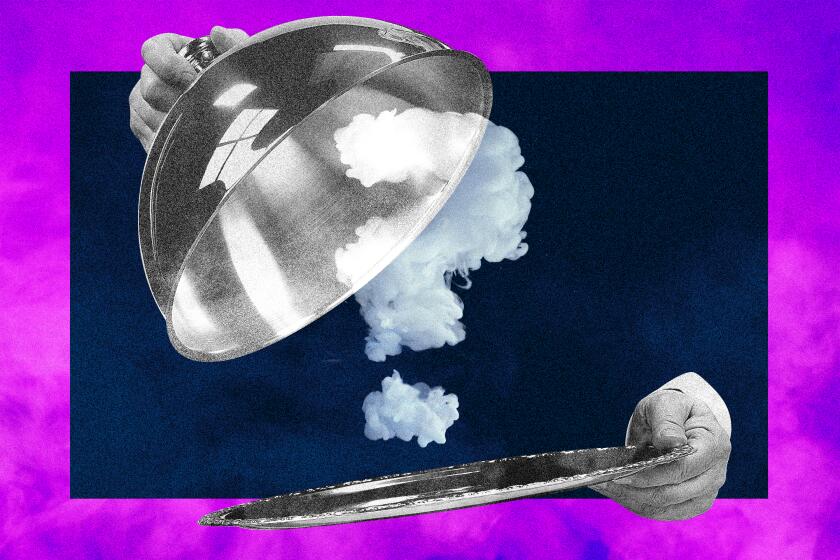Will Olivia Alexander become the queen of CBD?
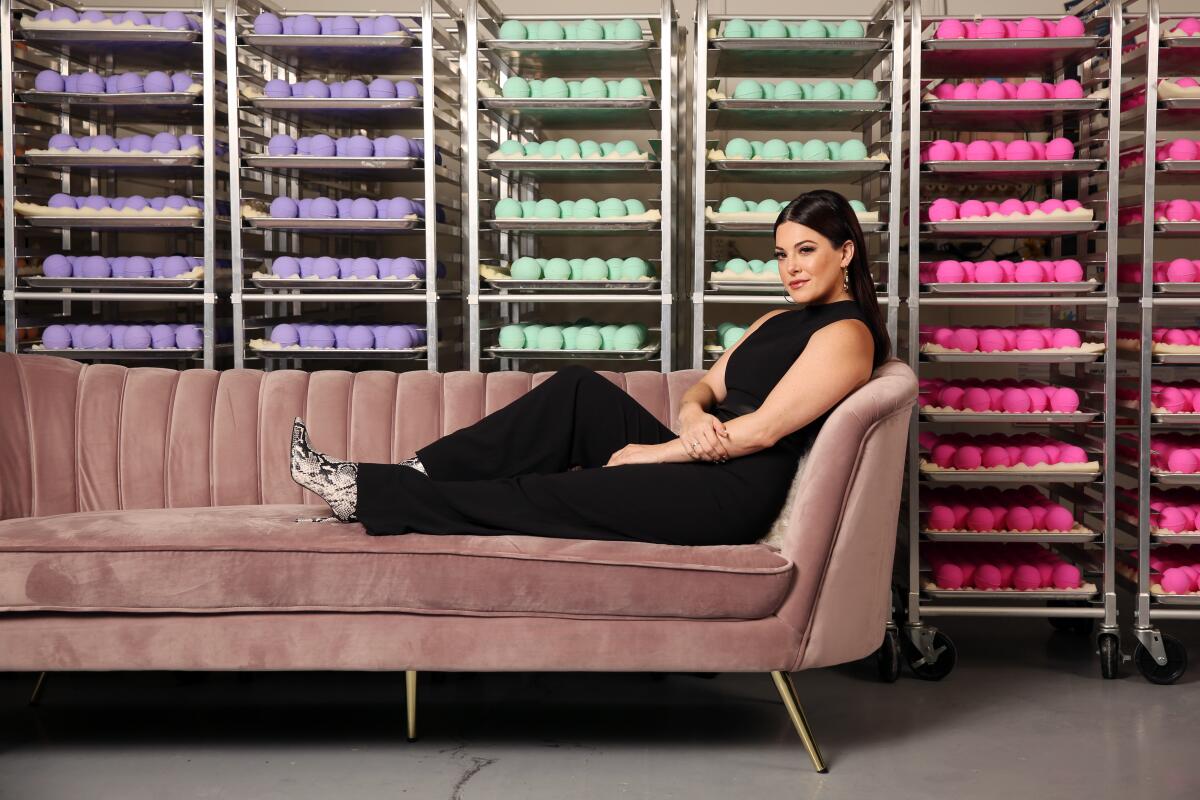
Olivia Alexander arrived in Los Angeles the way that people have for decades: hellbent on being a star. A Louisiana childhood spent competing in beauty pageants and dance precipitated her family’s move to Santa Clarita when she was 13, and she swiftly landed an agent and auditions. “My parents were typical high school sweethearts, and they thought I was special from the moment I was born,” said Alexander, now 31.
Alexander was sitting on a lilac couch at the 6,300-square-foot Anaheim headquarters of her 4-year old-company, Kush Queen, having traded the actor’s life for that of an entrepreneur’s. Her long, dark hair cascaded past a gold “LA” chain necklace. Around her were a collection of crystals and on a nearby wall was a pink neon sign announcing “I Want it All.”
There were framed photos of her 32-product cannabinoid line, which includes CBD- and THC-infused pain lotion, body wash and personal lubricant. Her bath bombs — chalky cannabis and CBD-infused orbs packed with essential oils that fizzle when dropped in water — are star products in a proliferating market that aligns cannabis with wellness, part of a greater hemp-derived CBD industry that is estimated to grow to $22 billion over the next three years. The bombs have experienced such mainstream success they are sold in Urban Outfitters, and this fall Kush Queen moved into the fashion space, releasing a three-product collaboration with Alice + Olivia, the New York-based women’s wear brand.
In the wake of Proposition 64, which went into effect legalizing cannabis sales in California in 2018, CBD brands are flooding the wellness market, trying to capture the sizable opportunity presented by mostly female customers willing to spend money on self-care. But few have the established longevity of Alexander’s branding and virtually none has her extensive social reach.
Kush Queen’s path to becoming a company projected to do $12 million in 2019 sales follows many of the challenges of the shape-shifting cannabis industry, but it’s also a story about Los Angeles, reinvention, social media, family and fame — starting with Alexander’s skill for cultivating an audience.
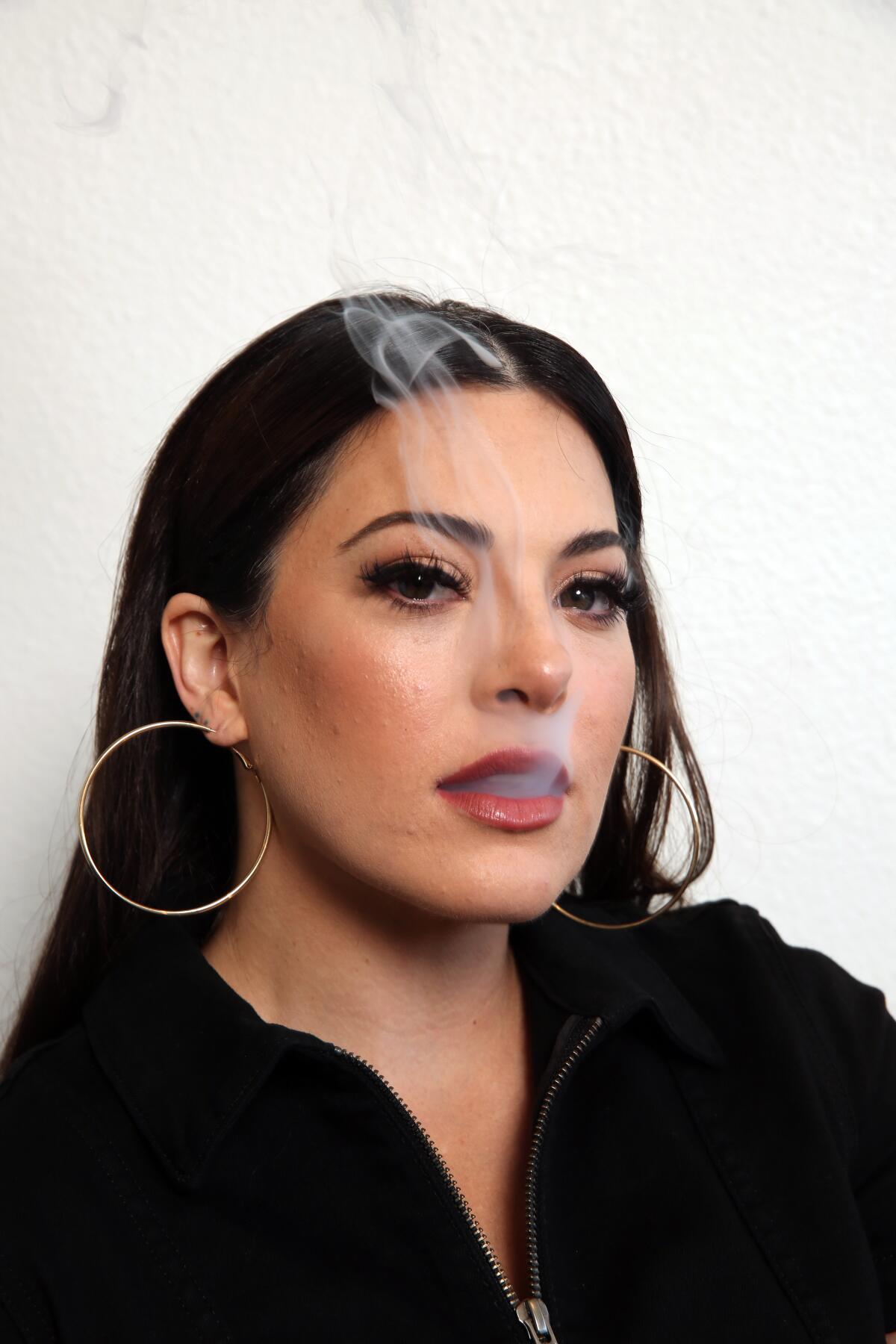
In 2007, Alexander started working at the Green Easy dispensary in West Hollywood, where she liked getting a discount on the marijuana she had started smoking in college. She left the job after the dispensary got robbed, and took on a slew of gigs while she attended school and auditioned for acting roles: a magician’s assistant at the Magic Castle, an event planner, a spot on “So You Think You Can Dance.”
But she never stopped thinking about an insight from her time in the dispensary: that customers came in looking for more than recreation. There were moms handling stress, people with disabilities, individuals battling cancer.
“It was life-changing,” Alexander says of that time. “I just knew cannabis was going to change the world. I felt, like, the calling.”
At a party in 2013 she was photographed next to Kelly Osbourne, holding a vape pen to which she had glued small gemstones she sourced in the garment district downtown. She started receiving messages on Instagram from people who wanted to buy it from her. In her retelling, she said she knew instantly that she was onto something. “I went home and told my father: This is what I’ve been waiting for. This is my moment, I feel it. I’m going to do this thing, it’s going to be called Crystal Cult, and I’m going to sell Swarovski crystal sunglasses and vape pens, and I need you to give me $700.’” (He did.)
She parlayed the money into $6,000 in online and Instagram sales in the first month. The growth was in part due to a particular Los Angeles alchemy: Alexander’s actor and dancer friends got sunglasses into the hands of people like Miley Cyrus. “Francesca Raisa? The girl who gave Selena Gomez her kidney? My friend Harvey Guillén got them to her,” says Alexander. Ariana Madix, who is now in the cast of “Vanderpump Rules,” modeled the products in photo shoots at the Alexander family home where everyone — Alexander’s father, mother and younger brother (the latter two of whom still work for the company) helped affix rhinestones to product to keep up with demand.
The “Kush Queen” crystal vaporizer was her No. 1 seller, and then smaller, sleeker e-cigarettes entered the market and she started bedazzling those. “That’s when I found the Kush Queen customer,” recalled Alexander. That person was female, and couldn’t relate to the cannabis experience presented by a largely male industry. She “wasn’t a stoner, didn’t smoke out of a bong, or know how roll a joint.”
Alexander executed photo shoots for the Crystal Cult social media accounts that featured marijuana alongside designer fashion, flowers, or her own face, made up with colorful makeup and well-coiffed hair. She borrowed a Birkin, filled it with weed, and photographed it in a high-rise. The imagery combined just enough aspiration and relatability, often incorporating popular online tropes. She posted her images on every social platform that she could — even conservative-leaning Pinterest. “They were getting seen by all of these people who would never go near a dispensary, never go near the smell of weed — I brought it to them,” she said. Her Instagram accounts proliferated: EatWeedLove (food-focused), BudFeed (memes and millennial humor), WeedBae (female-focused), Kush Queen (reposted images of girls smoking weed), Weed Quero (Spanish-related).
After her reputation for building online audiences brought in requests from cannabis brands for her social strategy, in 2015 Alexander founded the Third Eye Agency with her now-fiancé Michael Sawyer. As much as Instagram has been a game-changing strength for Alexander, however, it is also her Achilles’ heel. Evolving social media regulations meant that she could see an audience proliferate, only to have the page be censored or removed for promoting a Schedule I illegal substance. (Her current account, @kushqueenshop, has 58,000 followers.) “We’d have campaigns scheduled with brands, and our pages would be gone. People wanted their money back. It was terrible,” she said. (These regulations remain convoluted today).
So, in 2017, Alexander pursued a vision for her own brand: CBD-infused bath bombs. “I knew people were interested in the medical benefits of cannabis without the high, and that selling the bath bomb was like a gateway drug. That’s all I was looking for: how am I going to weasel my way into the mainstream.”
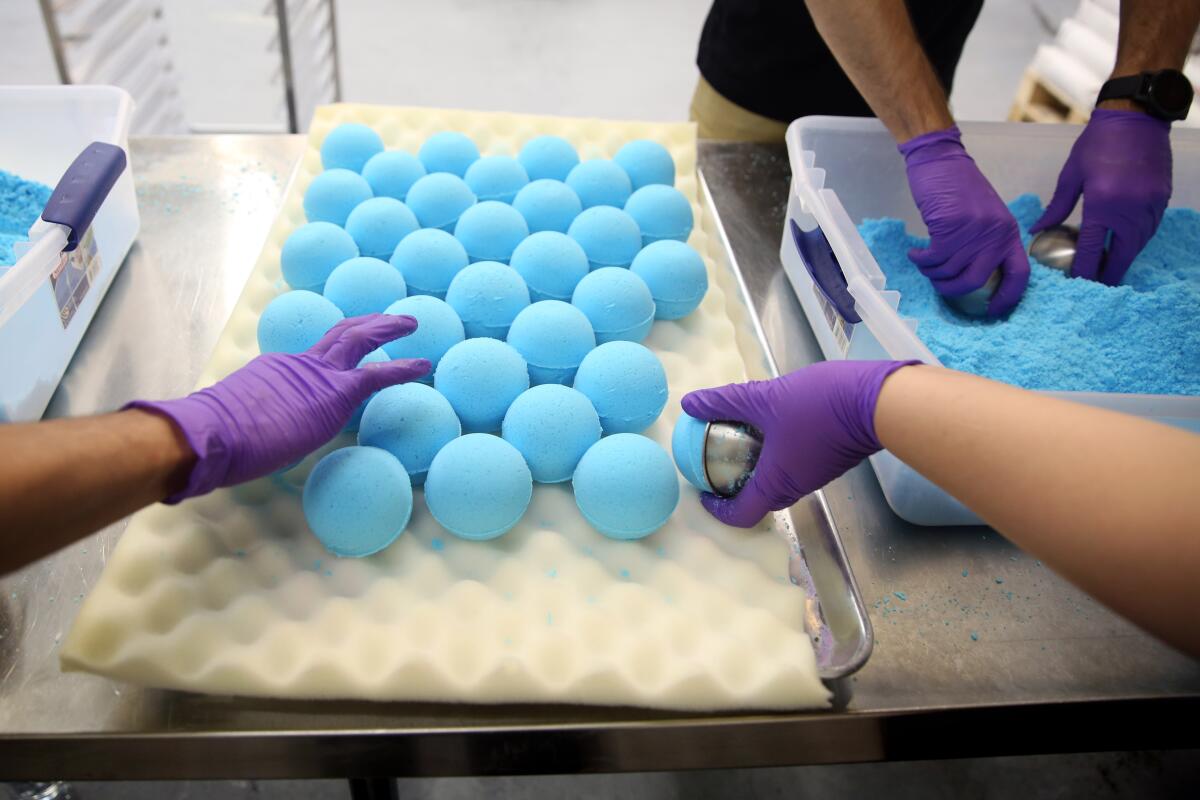
The family operation at the home in Santa Clarita shifted from rhinestones to baking soda and got to work producing what would become Kush Queen’s signature product. Today, some of those bath bombs contain hemp-derived CBD, and some THC and all look very pretty dissolving on Instagram. The blend of CBD and essential oils, Alexander says, uses the entourage effect of helping maximize the therapeutic benefits of the cannabidiol. One formulated with mandarin orange, sweet marjoram and lavender is said to provide intense relaxation beneficial for sleep. The Shield for Immunity bath bomb contains 100mg of pure CBD and essential oils like clove, rosemary and cinnamon. (“That one is Kris Jenner’s favorite,” said Alexander.) Her THC bombs are said to achieve “even deeper relaxation and mental clarity.”
Shanna Droege, founder of Costa Mesa-based Sol Distro — a distribution network of more than 400 California dispensaries — recognized the bomb’s potential right away: “It was pretty. It was girly. It was bright. It’s the name — every girl thinks they’re a Kush Queen — it’s the impulse buy.” Droege encouraged Alexander to develop the product and said she’d put it on her truck; overnight, Kush Queen bath bombs were in dispensaries. “My husband said “Nobody’s going to buy those,’” said Droege. “And they’re among our bestsellers now.”
Droege also credits Alexander’s candor and online presence — her propensity to wear funny, face-distorting filters on Snapchat, for example, and speaking out for those who have been incarcerated for pre-legalization marijuana sales -- as integral to the brand’s success. “She’s a character,” said Droege. “She’s over-the-top and has a lot to say. She’s smart as well, and not scared to come out and say what she thinks.”
Through the partnership with Sol Distro, Kush Queen has grown its product range to encompass facial serum, gummies and bestselling Melt pain lotion. All CBD-derived products are available through her website (THC products can only be purchased via dispensary), but even this process has revealed an industry with standards in flux: She sometimes has transactions halted due to issues with processing companies, the intermediaries between cannabis companies and banks.
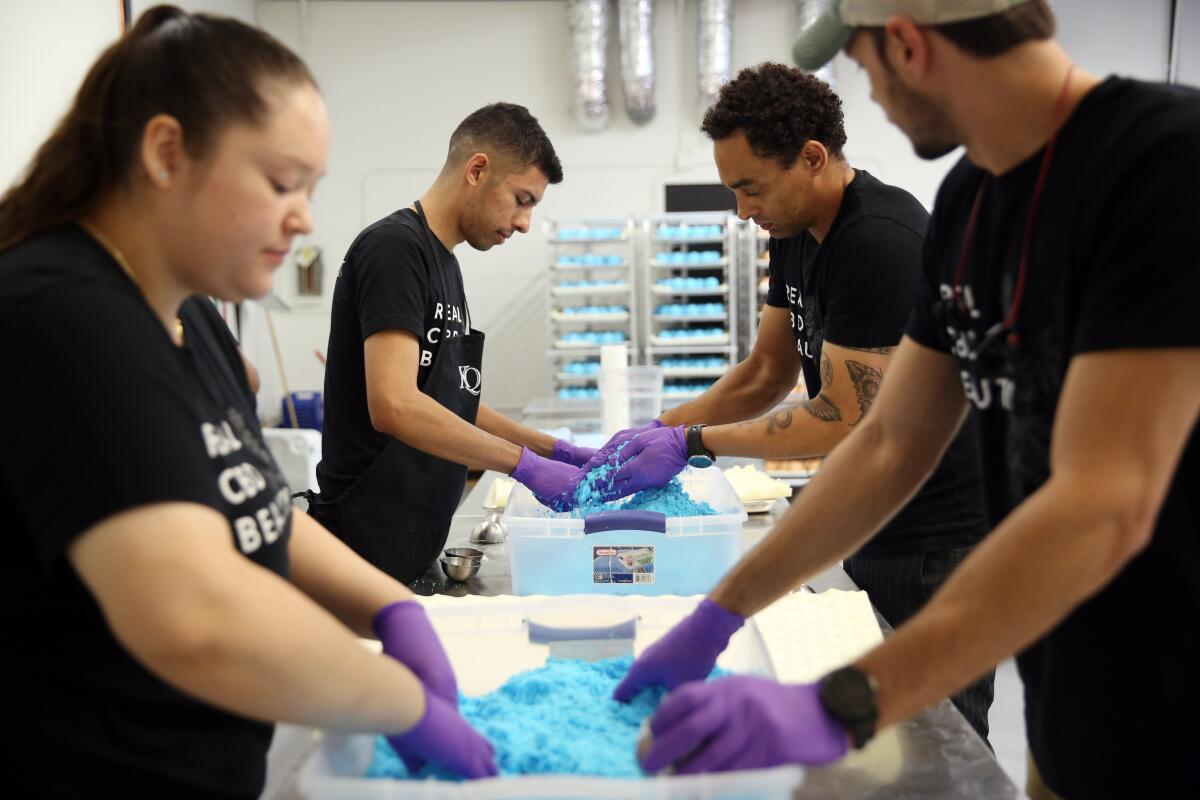
Since Kush Queen’s debut as a self-care company, it has been joined by what feels like countless brands occupying a similar, female-focused space, from Foria Wellness lubricant, to Rosebud tincture, to Cannuka to Kana Skincare ... not to be confused with Gara Skincare.
“The health and wellness market that is female-focused is a majority of the market,” says Ricardo Baca, chief executive of Grasslands, an agency that works with cannabis clients. “So this is legitimately — and I can say this without hyperbole — a once-in-a lifetime opportunity because the market is so prepped for it. So much of this comes down to who you know and what does your product look like. Does your product look like it belongs alongside more traditional brands in Nordstrom or Sephora? That has been huge in elevating unknown brands to multimillion-dollar companies. Kush Queen has done a really good job of that.”
This considered branding caught the eye of Alice + Olivia’s Stacey Bendet, a fan of Kush Queen gummies and tincture. At New York Fashion Week last month, she and Alexander unveiled CBD Bubble Bath, Body Lotion, and a 200 mg bath bomb which will be available at 22 Alice + Olivia locations, and online at kushqueen.shop. “The brands exist in the same world,” explained Alexander. “Colorful, fun, playful, with women at the helm.”
Alexander is using the same thinking that has served her in the past— that you can bring in new fans of cannabis with products that feel familiar— for the next chapter of Kush Queen: makeup. At Beautycon LA, she introduced KINGDM CBD Primer — the first in a line that will include setting spray, and CBD-infused foundation and eye shadow. She’ll also make THC versions.
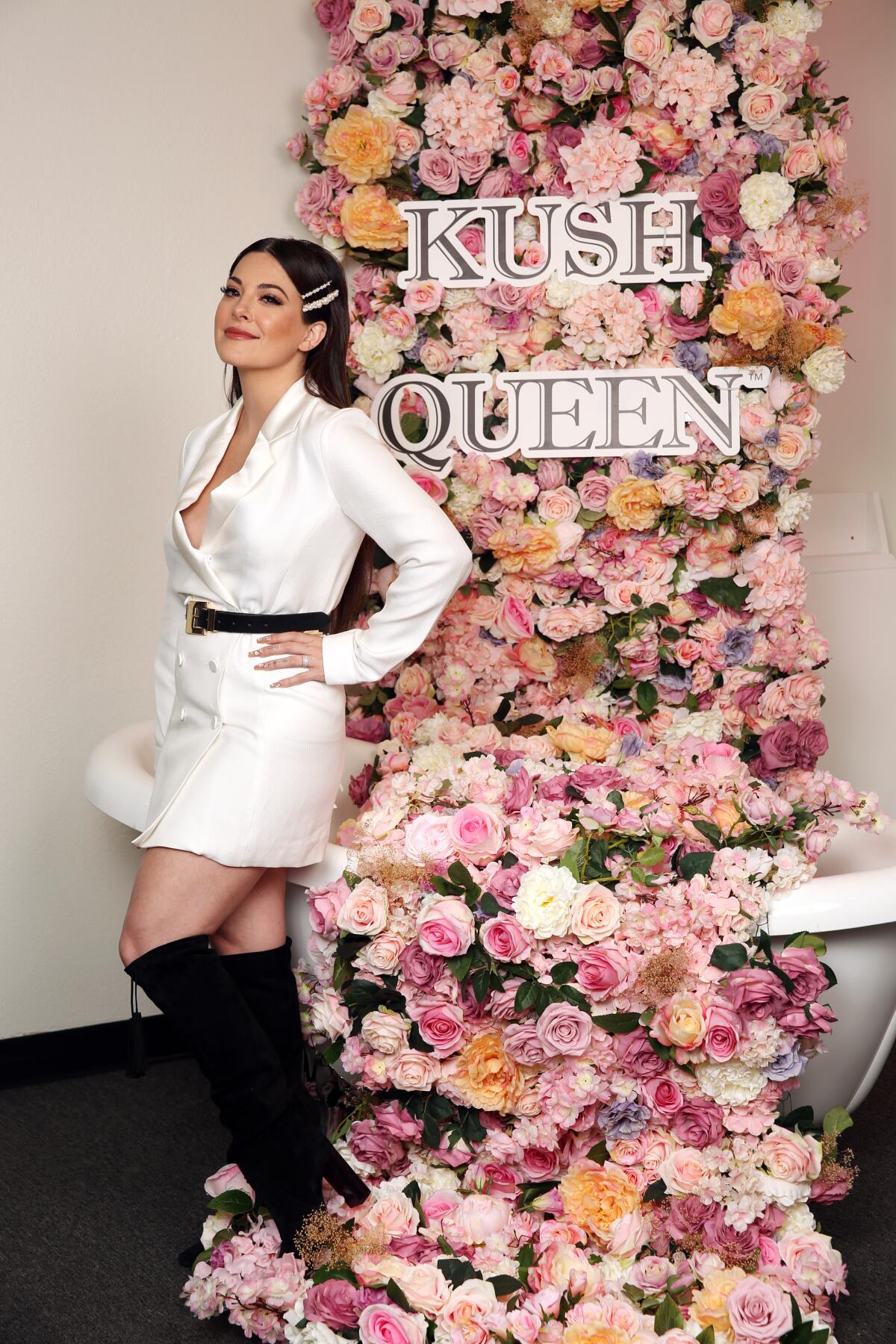
“People buy beauty products to feel something, but they don’t make us feel anything; I want to push that boundary,” said Alexander. “Under our makeup we’re creating inflammation and redness. The idea is that in wearing CBD, we’re putting powerful anti-inflammatory onto it, absorbing into the skin through the bloodstream.”
With the industry awaiting CBD regulations from the 2018 Farm Bill, which legalized hemp and its derivatives, brands are hesitating to go all in on edibles and tinctures, assuming that forthcoming FDA standards will require adjustments for things we ingest. Kush Queen’s continued focus on topicals seems to be a safer bet.
“So much about what I do isn’t just for Kush Queen,” Alexander said of why she chose makeup as the next frontier. “It’s about being the first person in the space.” When asked if she ever considers that she had swapped one stage for another — the camera for tens of thousands of followers — she replied: “I always say I want to be the Jennifer Lawrence of weed, and then my fiancé says ‘No, no, honey, you’re the Meryl Streep of weed.’”
More to Read
Sign up for our L.A. Times Plants newsletter
At the start of each month, get a roundup of upcoming plant-related activities and events in Southern California, along with links to tips and articles you may have missed.
You may occasionally receive promotional content from the Los Angeles Times.





